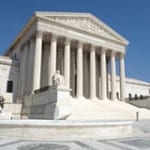
The fair use doctrine allows limited use of copyrighted material, but artists are wary of its inherent uncertainty and the harsh penalties for copyright infringement. Professor Peter Menell proposes a fee-shifting solution that clarifies usage rights and offers incentives to resolve disputes quickly.

A new study by Professor Justin McCrary suggests that U.S. cities may want to hire more cops. McCrary found that every dollar spent on police reduces victimization costs by about $1.60. The data also show that police are more effective at reducing violent crime than property crime.

The 2011 America Invents Act (AIA) revamped some key rules in the U.S. patent system. In Priority and Novelty Under the AIA, Professor Robert Merges describes the seismic shift from “first-to-invent” to “first-to-file” and helps patent applicants navigate the new legal landscape.

In The Forgotten Core Meaning of the Suspension Clause, Professor Amanda Tyler explores the historical record to determine what our country’s founders meant by the Writ of Habeas Corpus. Her findings call into question the constitutionality of detaining U.S. citizens as so-called “enemy combatants” in the wake of 9/11.

The National Security Agency illegally tracks the electronic communications of millions of innocent Americans, according to an amicus brief filed by the Samuelson Clinic. Countering claims that litigation would reveal state secrets, the brief refers to existing procedures for reviewing sensitive evidence.

A new study led by Taeku Lee shows that Asian-American voters favor Barack Obama over Mitt Romney 43% to 24%, but nearly one-third are undecided. This cohort could be a potent voting bloc: the Asian-American population grew faster than any other group (46%) between 2000 and 2010, and one in six lives in a swing state.

Senior Fellow Richard Rothstein disputes an argument by educator Joel Klein that poverty has little to do with poor school performance. Rothstein’s new article points out that Klein, who cites his childhood in “public housing” as proof, actually grew up in projects that were restricted to middle-class families.

A study of consumer attitudes by Chris Hoofnagle, Jennifer Urban, and Su Li finds that most Americans oppose any collection of data about their online activities. The Berkeley Law trio fault both the ad industry’s proposed self-regulatory guidelines and the federal “Do Not Track” proposal. Read the New York Times story here.Â

Assistant Professor Stavros Gadinis’ study of SEC enforcement actions against broker-dealers is getting national attention. Results from the first such systematic examination in 30 years reveals that size matters. Larger firms fare better than smaller ones, which face tougher SEC sanctions.Â

An article co-written by Professor Victoria Plaut argues that our sense of well-being is influenced markedly by our home city. In studies comparing San Francisco and Boston, she finds that San Franciscans value innovation and egalitarianism, while Bostonians prioritize tradition, community, and tighter social norms.

A new study by Professor Eric Biber finds that public citizens are better at pinpointing endangered species than the Fish and Wildlife Service. A Science magazine article co-written by Biber about the study caught the attention of the New York Times, which published an editorial on the topic.

Cops typically arrest and jail criminals; they rarely help released prisoners navigate the return home. But a paper co-authored by Sarah Lawrence, a director at Berkeley Law’s Warren Institute, says an active police role in prisoner reentry could help reduce crime and recidivism in poor communities.

Legal services programs help more than one million low-income clients annually, yet scant evidence exists about their efficacy. In a new Yale Law Journal essay, clinical law professor Jeffrey Selbin calls for empirical research to help improve and expand the delivery of legal services to clients in need.

The Yale-Harvard-Stanford Junior Faculty Forum selected Asst. Prof. Bertrall Ross’s new paper to discuss at its recent annual conference. Ross argues that the Supreme Court uses nuanced standards to assess whether electoral laws dilute racial minorities’ votes, even though equal protection claims require proof of intentional discrimination.

African Americans make up 14 percent of the U.S. population, but 44 percent of those who are HIV-positive, while Latinos have triple the infection rate of whites. In a new paper, co-author Russell Robinson says structural inequities, not high-risk behavior, create the wide disparities in rates and outcomes of minorities with HIV/AIDS.

Residential buildings account for about 20 percent of U.S. greenhouse gas emissions. A new report by Lori Bamberger, senior fellow at the Berkeley Center for Law and Business, lays out a plan for significantly increasing the pace of energy efficiency efforts in California’s existing single-family homes.

A new national survey by Berkeley Law’s Jennifer Urban ’00, Chris Hoofnagle, and Su Li found that Americans overwhelmingly consider information stored on mobile phones to be private. The vast majority of about 1,200 adults surveyed also rejected collection of mobile phone data for coupons, ads, telemarketing, and more.

A new report by the International Human Rights Law Clinic, Sexual Diversity in El Salvador, finds rampant abuse and discrimination against the LGBT community. Written by Clinical Instructor Allison Davenport, the report recommends stronger legal protections for that country’s transgender individuals.
The 100 most popular websites track their users online, and reliable ways to measure this activity are vital as policymakers confront consumer privacy concerns. A new Web Privacy Census, co-developed by Berkeley Law’s Christopher Hoofnagle, attempts to do just that, by measuring online tracking over time.

In a new paper, American Youth ViolenceÂA Cautionary Tale, Professor Franklin Zimring examines criminal trends since 1975 and finds catastrophic errors in juvenile crime projections. He argues that adolescent violence has arrived at a “new normal” and that the volatile swings of the ’80s and ’90s are over.

A new report by Berkeley Law’s Chief Justice Earl Warren Institute on Law and Social Policy gives failing marks to California’s continuation high schools. Designed to help at-risk students, the schools too often serve as “dumping grounds” for disruptive teens.

Professor and Director of the Haas Diversity Research Center, john a. powell is the author of a new paper on poverty and race. Powell writes that in a mature democracy, poverty is “about social exclusion and the lack of belonging, not material inequality.” He argues that exclusion, often due to racial differences, is key to understanding and addressing poverty.

Information privacy law expert Chris Hoofnagle, Samuelson clinic co-director Jennifer Urban, and statistician Su Li surveyed consumers about purchasing goods and services with mobile phones. In a new paper, Mobile Payments: Consumer Benefits & New Privacy Concerns, the co-authors report that Americans overwhelmingly oppose cell phone payments that let retailers track their locations or obtain their contact info.

In Framing Cultural Difference: Immigrant Women and Discourses of Tradition, professor Leti Volpp argues for a better understanding of immigrant culture. Volpp says we assume that immigrant women will be emancipated when they have abandoned their cultures. But she proves this theory wrong through the work of domestic violence advocacy groups, expert testimony in a case of attempted parent-child suicide by a Sikh immigrant, and more.

Assistant Clinical Professor Jennifer Urban co-authors a Science article calling for the publication of software created during publicly-funded research. The authors argue that the release of open source code would yield substantial benefits including improved code quality, while allowing for adequate peer review and experimental reproduction.

The Human Rights Center has released a new report on the impact of Kenya’s Sexual Offences Act. The 2006 law was designed to stop that country’s sexual and gender-based violence often triggered by contentious national elections. The report concludes with a series of recommendations including the formation of a permanent government body to oversee implementation of the act.

People who sign petitions are more likely to vote than non-signers. That’s troubling news for Gov. Scott Walker in Wisconsin’s June special election, triggered by a recall petition with 1 million signatures. A new study co-authored by Shayne Henry ’14 is the first to match ballot petitions with official voter records.

Plaintiffs who base employment discrimination suits on multiple claims, such as race and age discrimination, are twice as likely to lose as those who cite just one claim. A new report co-authored by professor Lauren Edelman ’86 is the first systematic empirical analysis of this issue, tracking 35 years of federal decisions.

Justin McCrary is the co-author of a paper that analyzes juvenile criminal data. “Youth Offenders and the Deterrence Effect of Prison” finds that young criminals are not deterred by harsher punishments as they grow into adulthood. The co-authors predict that reforms to move juveniles to adult criminal courts will also fail to deter their criminal behavior.

Professor Melissa Murray’s award-winning article, Marriage as Punishment, has just been published in the Columbia Law Review. Murray finds that the romantic notion of marriage as bliss contradicts its historic role. Until the mid-20th century, marriage was seen as punishment for the crime of sexual seduction; it transformed sexual outlaws into in-laws.

American cities are going broke. Some are dying off, leaving ghost towns in their wake. Others are closing city offices and disincorporating. A new article by assistant professor Michelle Wilde Anderson explores how this trend affects issues such as governance, race, and community.Â

Despite Bank of America’s $335 million settlement of a racial discrimination in mortgage lending claim against its Countrywide subsidiary, problems persist. A new paper by Berkeley Law’s Richard Rothstein says such discriminatory practices are standard and that regulators have sanctioned them for nearly a century.

In a new quarterly column, professor David Gamage argues that restrictions on state tax hikes, or “tax increase limitations,” can be easily evaded. He says the term “tax increase” in this context is meaningless, and that California’s legislature can thus circumvent rules requiring a two-thirds vote.

Protection of personal data plays a key role in privacy law, especially if “Personally Identifiable Information” (PII) is involved. But professor Paul Schwartz says the current use of PII is misguided, putting our identities at greater risk. He proposes a new approach called “PII 2.0.”

Napa’s wine industry has long benefited from laws protecting agricultural land. An article co-authored by Richard Mendelson, director of Berkeley Law’s Wine Law and Policy Program, explains area voting requirements for re-designating such land and the impact of strict controls on local property taxation. Read it here.